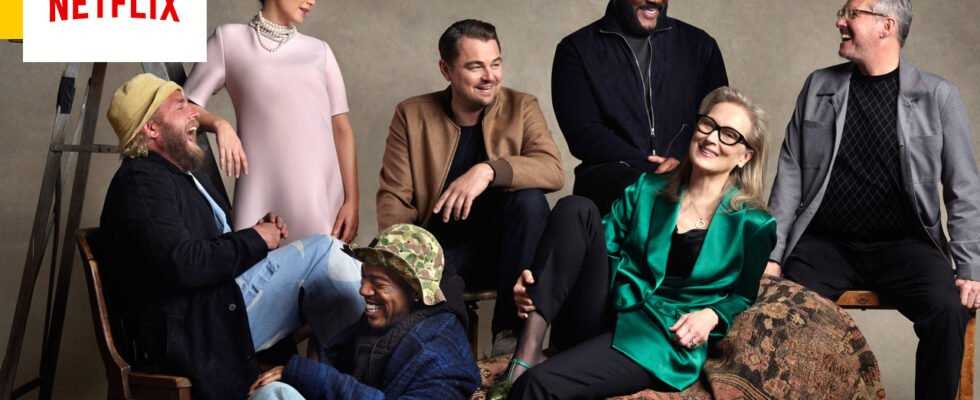A true pop and cultural phenomenon, Don’t Look Up is also a phenomenon among the intellectual elites. Or when pop culture meets the international intelligentsia…
Since its release on December 24, Don’t Look Up has continued to occupy the top 10 of Netflix but above all to fuel conversations. The film’s metaphor for talking about climate change seems to have a much stronger resonance than the alert launched, for example, by Jacques Chirac in 2002 during the 4th Summit of the Earth, when he said: “Our house is burning and we are looking elsewhere.“
Faced with the cultural and media phenomenon, many are the intellectuals to bounce on the film, to analyze it, to extol it, to qualify its remarks when some deplore that it has to come to this to begin to be alarmed. And it’s true that Don’t Look Up has some arguments to put the debate on the ecological crisis back at the center of concerns.
Its distribution on Netflix, which has more than 200 million subscribers worldwide, and its completely crazy casting, with Leonardo DiCaprio in the lead, are major assets. A fervent defender of the ecological cause, the actor seemed ideal to play Dr. Randall Mindy who fails to find an attentive ear when he announces that a comet will crash into the planet in 6 months.
The scientists
The scientific community was the first to jump at the chance and welcome the film’s message. When some are only interested in the somewhat too literal aspect of the film – namely the destruction of humanity by a comet – Time Magazine take the opportunity to highlight NASA’s work in this area and the impressive arsenal put in place to destroy an asteroid that would go straight for the Earth.
For astrophysicist Neil deGrasse Tyson, Adam McKay’s satirical disaster comedy rings so true that he joked on Twitter that Don’t Look Up is actually a documentary.
“Finally seen the @Netflix movie “Don’t Look Up”, a fictional tale about a nation distracted by pop culture and divided on whether to heed the dire warnings of scientists. Everything I know about streaming news, talk shows, social media and politics tells me the movie was more of a documentary“he writes.
In The Guardianit is the climatologist Pierre Kalmus who says that Don’t Look Up captures the madness he sees every day: “The movie Don’t Look Up is a satire. But as a climatologist doing everything I can to wake people up and prevent planetary destruction, it’s also the most accurate film about society’s terrifying non-response to climate breakdown that I’ve seen.“
Lisa Graumlich, president-elect of the American Geophysical Union and professor in the School of Environmental and Forest Sciences at the University of Washington, told Yahoo News : “I went from laughing to tears, because it rang so true. (…) Not being taken seriously, sometimes ridiculed by the press, having politicians sometimes attentive for a while but then losing focus, for many of us that was very close to what we experienced .“
intellectuals from all walks of life
In France, the phenomenon is no exception. Maxime Abolgassemi, professor of general culture in preparatory classes in Rennes, split from a platform in The world. He defends the film and the enthusiasm around it because it confirms the lesson of La Fontaine in The power of fables. In summary, sounding the alarm is not enough to mobilize. To unite the people, you have to tell them a story, entertain them, tap into their power of imagination and there, they will mobilize.
always in The world, Elise Domenach, philosopher and lecturer in film studies at the Ecole Normale Supérieure in Lyon, places the film in a history of eco-cinema to which belongs, among others, Cyril Dion, also a fervent supporter of Don’t Look Up. But she scratches the film a little, criticizing it for being too demonstrative, and questions its ability to cause real political and societal upheaval.
NIKO TAVERNISE/NETFLIX
Another column, even more critical, was published in The world. It is the ecologist Philippe Grandcolas who takes up the pen to denounce not the film itself but the reactions of scientists to the film. This CNRS research director criticizes his colleagues for completely ignoring the biodiversity crisis.
“A silence that is all the more shocking as the ubiquitous #dontlookup hashtag strongly denounces climate denial… but completely ignores that of the biodiversity crisis. Would it be a denial in denial?“he writes.
This is the first time that we have seen a Netflix film become such a cultural phenomenon that challenges and questions a subject as urgent as climate change. A question arises, however, in view of all this agitation: is it the striking power of Netflix that makes it possible to put this burning subject back at the heart of the debate or does this moralizing fable have no other purpose than to restore the coat of arms of the platform?
